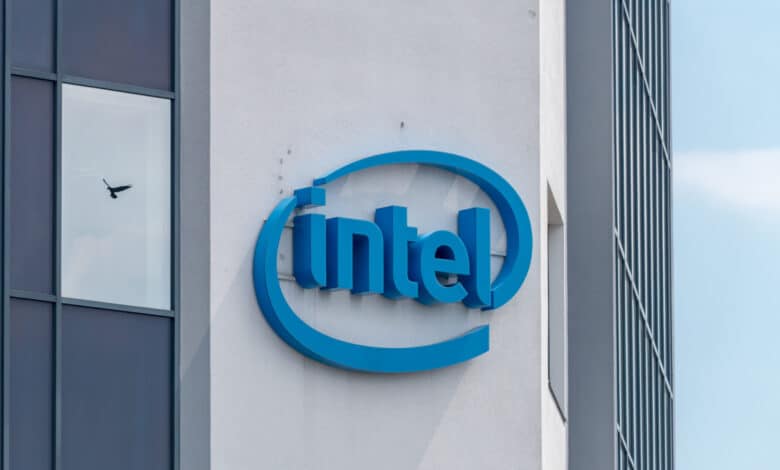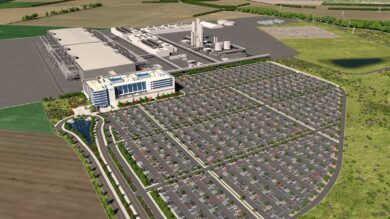
Since the rampant global semiconductor shortage is also a major problem in Europe, the EU launched an extensive subsidy offensive to lure well-known manufacturers to our shores. Now a big fish has bitten. Intel wants to build up a huge pillar of its worldwide chip production in the EU. In addition to countries like Ireland, Italy and France, a site is also to be built in Germany. Intel wants to invest a total of 33 billion euros in the process.
A semiconductor ecosystem in Europe
Are you too currently plagued with a month-long wait for your new car? Or maybe you just want to finally call a PlayStation 5 or Xbox Series X your own, but are stymied by rare availability? Whether you’re suffering from one or the other. The cause is the same – the semiconductor shortage. The chip crisis, which has been going on for many months now, means that electronic components in particular can only be produced at a sluggish pace. The world champion in semiconductor production is clearly China. However, due to the Corona crisis and closed factories, factory employees simply could not keep up with production.
Western companies now want to shake off this clear dependence on Chinese production. Instead, they want to rely more on semiconductor production in their own region to prevent corresponding uncertainties. Accordingly, the EU attracted Intel with its extensive subsidy package for semiconductor production in its own region. As the world-renowned U.S. company has now announced, it has a number of plans for its European locations. Thus one would like to invest in the next ten years scarcely 80 billion euro into the semiconductor location EU.
The beginning makes Magdeburg
Intel also went in search of a suitable location in Germany. The candidate Magdeburg was considered the underdog. But even though the capital of Saxony-Anhalt had strong competitors such as Dresden, it was ultimately able to prevail. Two ultra-modern semiconductor factories are now to be built in the industrial area of this city steeped in history. Intel is spending a lot of money on this. A total of 17 billion euros is to be invested in the eastern German city. And that is just the beginning. In addition to the factories, Intel also wants to establish a serious science location.
For this purpose, a research center as well as a development and design center are to be built. However, there is no room for this complex in Germany. France has been awarded the contract. The list goes on and on. Intel not only wants to build brand-new locations, but also to expand existing ones. In particular, investments are to be made in the branch offices in Ireland, Italy, Poland and Spain. At the end of this ten-year path, there should be a chip ecosystem that meets the most modern standards. According to Intel’s press release, this is intended to build
“a more balanced and resilient European supply chain”
“Important step for both Intel and the EU”
The chip crisis had serious economic consequences for almost every industry. Here, it became clear that almost every sector of the economy is now dependent on semiconductors in the course of digitalization. This makes it all the more important for Europe to make itself a bit more sovereign of suppliers. Pat Gelsinger, CEO of Intel, is also of this opinion:
“The investments we are planning are an important step for both Intel and the EU. The ‘EU Chips Act’ enables the private and public sectors to work together to significantly strengthen Europe’s position in the semiconductor sector. Our forward-looking initiative will boost Europe’s innovation in research and development and bring state-of-the-art manufacturing capabilities to the continent – which could benefit customers and partners worldwide. Intel aims to play a major role in shaping Europe’s digital future in the decades ahead.”
Creating a global semiconductor market
Intel says it is important to ensure a balanced global semiconductor market. To achieve this goal quickly, Intel is pushing accordingly. Construction of the two chip factories in Magdeburg is to begin in just under a year. The prerequisite for this, however, is that the EU Commission and the German authorities grant the promised subsidy approval in advance. Intel clearly refers to the so-called “EU Chips Act”. This provides that the EU wants to financially support projects for the creation of a European chip production. Thus one would like to be less independent of the world market.
Modern chip technology made in Germany
It is already exciting what Intel is planning in its two state-of-the-art factories in Magdeburg. Starting in 2027, for example, chips that comply with the company’s own “IDM 2.0” strategy are to roll off the production lines. These are to be able to be manufactured with the most modern transistor technologies. Intel emphasizes that Germany is the perfect location to set up such a production facility. The reasons are obvious. After all, there are not only highly qualified specialists here. Thanks to the central location in the middle of Europe and the great infrastructure around the industrial area in Magdeburg, Intel should be provided with the best conditions. Not only the IT industry will be pleased about the project.
The otherwise rather structurally weak region around Magdeburg should also experience a real upswing. After all, the construction of the factories will not only accommodate skilled personnel specializing in chip production. Intel has already hired almost 7,000 people from the construction industry for the construction of the building complex. After completion, 3,000 jobs are to be created permanently for Intel employees in the factories. In addition, the chipmaker expects to create tens of thousands more jobs, particularly for suppliers and general infrastructure. To realize this, Intel wants to put a whopping 17 billion euros in hand as an initial investment.
This is what is planned in the rest of Europe
Magdeburg is not the only investment location on the horizon. Since Intel also wants to expand existing branches of the company, the manufacturing site in Ireland is also getting a cash injection. With the help of 12 billion euros, the existing production area would even like to be doubled. Cooperation with Italy is also at an advanced stage. According to the chip manufacturer, it is still in talks with the authorities about the construction of a back-end production facility. Here, 4.5 billion euros are to flow in and many new jobs are also to be created. Intel wants to create a new standard for the entire EU with its factory in Italy. But to ensure truly efficient semiconductor production, you also need a solid network. Intel also wants to work towards this. The goal, he said, is to bring the
semiconductor value chain closer together
That should make for far more stable supply chains.
Chip manufacturing as a missing piece of the puzzle in the EU
As part of its press release, Intel emphasized that Europe already has the best location prerequisites and that both sides can benefit from each other. After all, there are plenty of universities and research institutes in the EU that specialize in IT. In addition, Europe is already a big player on the world market in the field of chip design. With chip manufacturing and the expansion of already existing structures, Intel can now form the missing piece of the puzzle. So says the press release:
Supporting this innovation cluster through additional investment in research and development and linking it to Intel’s planned state-of-the-art manufacturing will significantly accelerate the momentum of innovation in Europe and also give small and medium-sized enterprises (SMEs) better access to cutting-edge technologies.
All of Europe is set to benefit
If Intel has its way, the investment should be able to become a real turbo for the entire European economy. The company, which has now been active in Europe for over 30 years, not only wants to create lots of new jobs. On top of that, it can support other companies in the age of digitalization with suitable technical solutions. According to Intel, the focus is not only on the economy. On top of that, the company wants to attach great importance to climate protection with its approach. In particular, the implementation of the much-invoked “European Green Deal” is close to Intel’s heart. This is to be achieved, among other things, through more energy-efficient chips.
It is therefore hardly surprising that Intel, according to its own statements, is heading towards achieving the sustainability goals in terms of the European climate targets. Among other things, this is to include the plan to operate every site of the new project completely with ecological electricity. What Intel is planning in Europe sounds like a real breakthrough for the chip industry. It is possible that the EU Chips Act has borne fruit and finally brought a well-known manufacturer to Europe. This could be the way out of the long-lasting chip crisis and towards more independence in the age of digitalization.






No replies yet
Neue Antworten laden...
Neues Mitglied
Beteilige dich an der Diskussion in der Basic Tutorials Community →